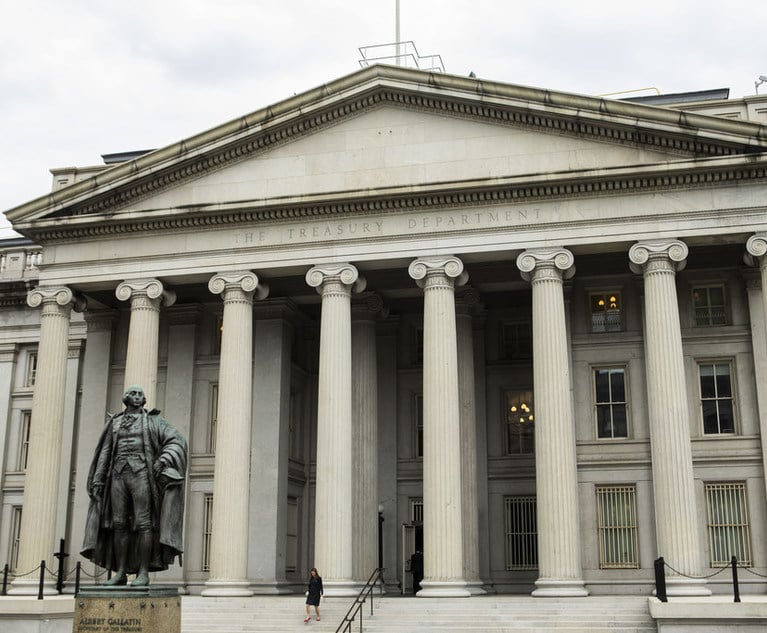Regulatory: Collaborating to solve the vexing UDAAP dilemma
The Consumer Financial Protection Bureaus (CFPB) authority to prevent unfair, deceptive or abusive acts or practice (UDAAP) under the Dodd-Frank Wall Street Reform and Consumer Protection Act is, as it turns out, a very powerful weapon.
May 01, 2013 at 03:08 AM
5 minute read
The original version of this story was published on Law.com
The Consumer Financial Protection Bureau's (CFPB) authority to prevent unfair, deceptive or abusive acts or practice (UDAAP) under the Dodd-Frank Wall Street Reform and Consumer Protection Act is, as it turns out, a very powerful weapon. UDAAP, particularly with the addition of the new abusive standard, is a highly utilitarian policy tool in the hands of our neophyte regulator.
What do I mean by that? What I mean is that the CFPB, if it chooses, can use the broad and vaguely worded UDAAP standards to address a policy agenda—even one that is unpublished, unwritten or unstated, as opposed to regulating unfairness, deception and abuse by guidance through public rulemaking or some other less opaque means. In other words, UDAAP gives the CFPB the power to look at the acts and practices of anyone subject to its jurisdiction and declare those acts or practices—without notice—to be unfair, deceptive or abusive. The CFPB can use its own subjective nose and declare something foul.
A prime example is the CFPB's sole attempt thus far at enforcing UDAAP. Last summer, the CFPB settled three investigations into the sales and marketing of credit card “add-on” products by third-party vendors of three major credit card companies. Although it may be obvious to you, it is worth pointing out that, other than labeling certain conduct as deceptive, the CFPB did not cite to any particular statutory or regulatory authority prohibiting the allegedly deceptive conduct at issue. Instead, regulators likely made an observation on their own or received complaints from third parties, conducted an investigation, and when other, more clearly defined statutes apparently had no application to the facts at hand (say, for example, the Truth in Lending Act, the Fair Credit Reporting Act or the Credit CARD Act), regulators defaulted to UDAAP. At the end of the day, the CFPB trotted out to the courtyard of public opinion and placed the heads of each of the credit card companies on a stake for all to see (figuratively, of course). Penalties and restitution totaling in excess of $525 million were levied by the CFPB and other regulators, and the message was clear: Violate UDAAP at your peril!
Is there something we can do to band together as an industry to collaborate on reasonable solutions to the vexing challenges that UDAAP presents?
Yes.
Under Dodd-Frank, the bureau's rulemaking abilities are broad, allowing the agency to “prescribe rules and issue orders and guidance, as may be necessary or appropriate to enable the Bureau to administer and carry out the purposes and objectives of the Federal consumer financial laws, and to prevent evasions thereof.” Indeed, Congress got downright suggestive that the bureau should at least consider UDAAP rulemaking, specifically providing that:
The Bureau may prescribe rules applicable to a covered person or service provider identifying as unlawful unfair, deceptive, or abusive acts or practices in connection with any transaction with a consumer for a consumer financial product or service, or the offering of a consumer financial product or service. Rules under this section may include requirements for the purpose of preventing such acts or practices.
There are some very compelling reasons for the CFPB to engage in UDAAP rulemaking. First, it will ultimately conserve the CFPB's precious resources as well as those of the regulated. Clear rules will narrow the CFPB's focus and give financial institutions—many of which are being crushed under the weight of Dodd-Frank absorption—a meaningful resource to guide their behavior.
Second, comprehensive and comprehensible rules will provide clarity and uniformity in the application of UDAAP. The CFPB's use of supervision, enforcement and adjudication are backward-looking and antithetical to notions of fairness and forward-looking clarity.
Third, public, inclusive rulemaking will allow the CFPB to articulate its policy about the UDAAP standards without regard to a particular set of facts. In other words, the bureau can articulate its understanding of unfairness, deception and abuse, and the industry can then rely on that understanding to govern its consumer-facing acts and practices, and risk management and compliance functions.
Finally, rulemaking is transparent and open—virtues the CFPB is enamored with when it comes to consumers. Transparency should not be a one-way street. Rather, the industry should enjoy the same benefit when it comes to UDAAP. The CFPB should let us “know before we loan,” just as it demands that consumers get to “know before they owe.”
How do we get there?
When it comes to UDAAP, the issues have no boundaries. It does not matter if you are a bank, thrift or credit union (large or small), a mortgage servicer, a prepaid credit card, a real estate settlement service, a debt collector, a credit reporting service or a check cashier. If you are within the CFPB's jurisdiction in any way, you are subject to UDAAP. Herein lies our power.
With numbers, there is power. And our numbers are great. There are, quite literally, countless companies that engage in the consumer financial services industry. We must get together and collaborate. We need to talk about what those rules would look like. We need to talk about standards and best practices. We need to set an agenda. In the meantime, we need to open the door and collaborate with the CFPB and other consumer advocates to understand and, where possible, address their reasonable concerns. It is time; this is your call to arms. Email me or go to www.udaap.com to find out more about what the rapidly growing UDAAP movement is up to and how you can help.
This content has been archived. It is available through our partners, LexisNexis® and Bloomberg Law.
To view this content, please continue to their sites.
Not a Lexis Subscriber?
Subscribe Now
Not a Bloomberg Law Subscriber?
Subscribe Now
NOT FOR REPRINT
© 2025 ALM Global, LLC, All Rights Reserved. Request academic re-use from www.copyright.com. All other uses, submit a request to [email protected]. For more information visit Asset & Logo Licensing.
You Might Like
View All
Internal Whistleblowing Surged Globally in 2024, So Why Were US Numbers Flat?
6 minute read
FTC Finalizes Child Online Privacy Rule Updates, But Ferguson Eyes Further Changes

Supreme Court Reinstates Corporate Disclosure Law Pending Challenge
Trending Stories
- 1New York-Based Skadden Team Joins White & Case Group in Mexico City for Citigroup Demerger
- 2No Two Wildfires Alike: Lawyers Take Different Legal Strategies in California
- 3Poop-Themed Dog Toy OK as Parody, but Still Tarnished Jack Daniel’s Brand, Court Says
- 4Meet the New President of NY's Association of Trial Court Jurists
- 5Lawyers' Phones Are Ringing: What Should Employers Do If ICE Raids Their Business?
Who Got The Work
J. Brugh Lower of Gibbons has entered an appearance for industrial equipment supplier Devco Corporation in a pending trademark infringement lawsuit. The suit, accusing the defendant of selling knock-off Graco products, was filed Dec. 18 in New Jersey District Court by Rivkin Radler on behalf of Graco Inc. and Graco Minnesota. The case, assigned to U.S. District Judge Zahid N. Quraishi, is 3:24-cv-11294, Graco Inc. et al v. Devco Corporation.
Who Got The Work
Rebecca Maller-Stein and Kent A. Yalowitz of Arnold & Porter Kaye Scholer have entered their appearances for Hanaco Venture Capital and its executives, Lior Prosor and David Frankel, in a pending securities lawsuit. The action, filed on Dec. 24 in New York Southern District Court by Zell, Aron & Co. on behalf of Goldeneye Advisors, accuses the defendants of negligently and fraudulently managing the plaintiff's $1 million investment. The case, assigned to U.S. District Judge Vernon S. Broderick, is 1:24-cv-09918, Goldeneye Advisors, LLC v. Hanaco Venture Capital, Ltd. et al.
Who Got The Work
Attorneys from A&O Shearman has stepped in as defense counsel for Toronto-Dominion Bank and other defendants in a pending securities class action. The suit, filed Dec. 11 in New York Southern District Court by Bleichmar Fonti & Auld, accuses the defendants of concealing the bank's 'pervasive' deficiencies in regards to its compliance with the Bank Secrecy Act and the quality of its anti-money laundering controls. The case, assigned to U.S. District Judge Arun Subramanian, is 1:24-cv-09445, Gonzalez v. The Toronto-Dominion Bank et al.
Who Got The Work
Crown Castle International, a Pennsylvania company providing shared communications infrastructure, has turned to Luke D. Wolf of Gordon Rees Scully Mansukhani to fend off a pending breach-of-contract lawsuit. The court action, filed Nov. 25 in Michigan Eastern District Court by Hooper Hathaway PC on behalf of The Town Residences LLC, accuses Crown Castle of failing to transfer approximately $30,000 in utility payments from T-Mobile in breach of a roof-top lease and assignment agreement. The case, assigned to U.S. District Judge Susan K. Declercq, is 2:24-cv-13131, The Town Residences LLC v. T-Mobile US, Inc. et al.
Who Got The Work
Wilfred P. Coronato and Daniel M. Schwartz of McCarter & English have stepped in as defense counsel to Electrolux Home Products Inc. in a pending product liability lawsuit. The court action, filed Nov. 26 in New York Eastern District Court by Poulos Lopiccolo PC and Nagel Rice LLP on behalf of David Stern, alleges that the defendant's refrigerators’ drawers and shelving repeatedly break and fall apart within months after purchase. The case, assigned to U.S. District Judge Joan M. Azrack, is 2:24-cv-08204, Stern v. Electrolux Home Products, Inc.
Featured Firms
Law Offices of Gary Martin Hays & Associates, P.C.
(470) 294-1674
Law Offices of Mark E. Salomone
(857) 444-6468
Smith & Hassler
(713) 739-1250







